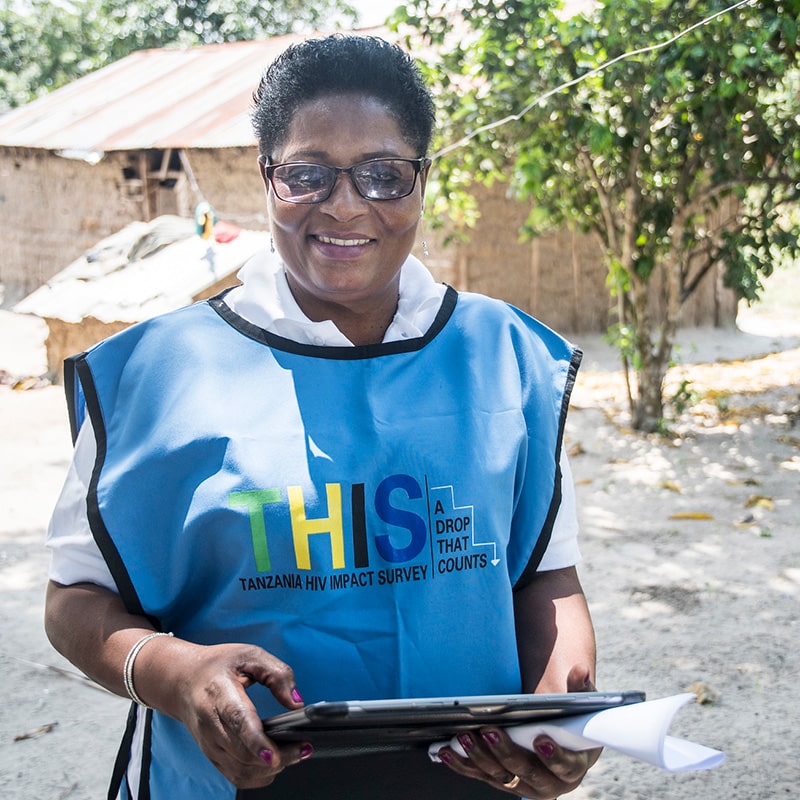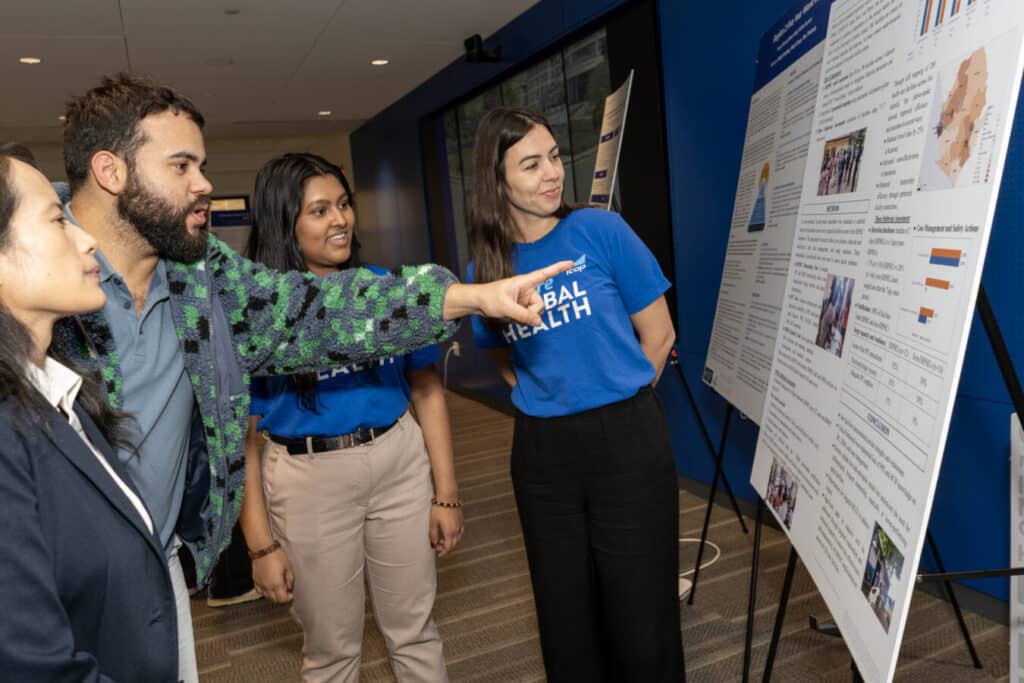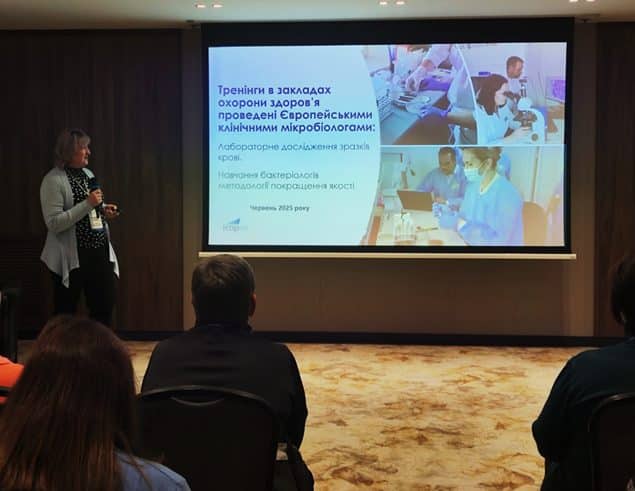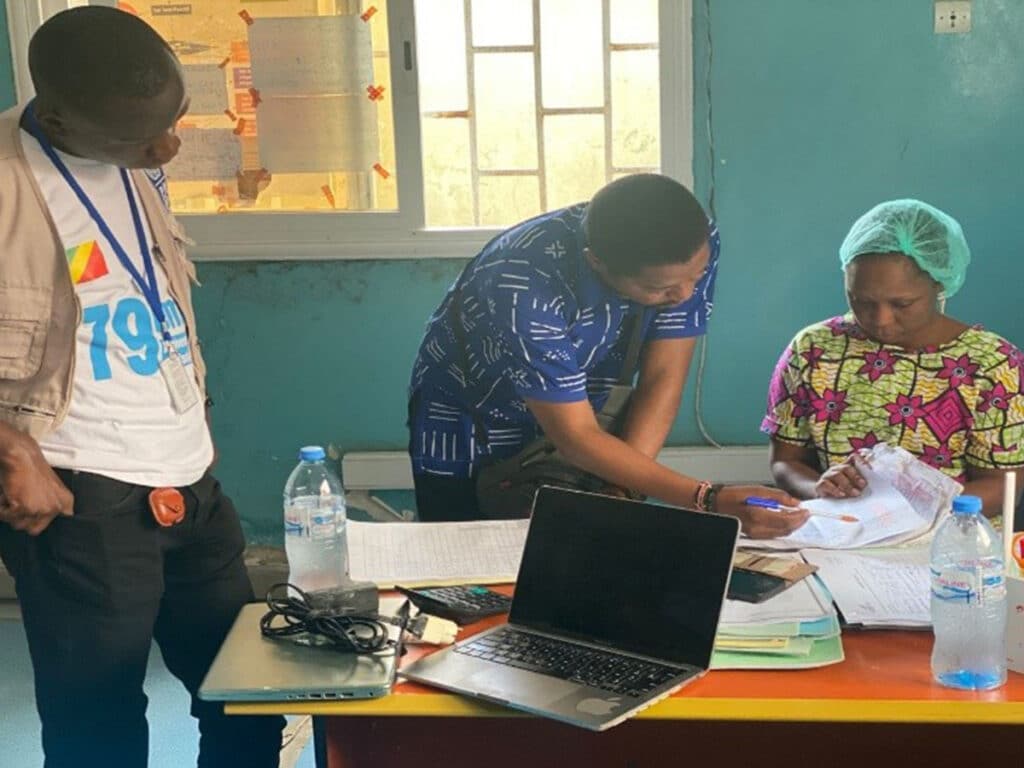Surveys
OVERVIEW

Standing at the forefront of global health, ICAP conducts innovative surveys that shed light on the burden of disease across sub-Saharan Africa, Eastern Europe, Southeast Asia, and the Americas. Working closely with national governments, local health authorities, individual health facilities, and across sectors and agencies, ICAP has designed and implemented numerous cutting-edge surveys worldwide. These collaborative efforts yield actionable data, illuminating critical trends and patterns, and paving the way for informed policy-making and strategic health interventions.
In alliance with strategic partners, ICAP provides capacity building to countries to precisely define and vigorously track the health of their populations, cultivating the expertise needed for high-quality, context-appropriate survey and measurement systems. Together, we ensure that each step towards disease prevention and control is informed by solid data and tailored to local needs.
ICAP not only creates and executes surveys that characterize and monitor population-level health but also strengthens governments and other partner organizations through technical assistance with the tools and knowledge to independently conduct essential health surveillance. This dual approach has provided critical data for programmatic use and laid the foundation for sustainable health surveillance.
ICAP’s survey program is wide-ranging in type, from nationally representative, population-based household surveys with biomarker collection to subpopulation- or location-based surveys that utilize respondent-driven, time-location, or grid-based sampling. In certain projects, ICAP offers comprehensive end-to-end support for the implementation of public health surveys; in others, we deliver targeted technical assistance and training to partner organizations to carry out high-quality, context-appropriate surveys.
The reach of ICAP’s survey initiatives spans nearly 30 countries, including:
Angola, Brazil, Cameroon, Côte d’Ivoire, Democratic Republic of the Congo, Eswatini, Ethiopia, Haiti, Kazakhstan, Kenya, Kyrgyzstan, Lesotho, Malawi, Mali, Mozambique, Myanmar, Namibia, Panama, Rwanda, Sierra Leone, Tajikistan, Tanzania, Uganda, United States, Zambia, and Zimbabwe
HOUSEHOLD SURVEYS
Household surveys, which are conducted among a representative sample of households in a population, play a pivotal role in assessing disease burden and developing an understanding of population health, behaviors, resilience, and risks. They are particularly useful in reaching individuals who do not have regular contact with the health system. The information gathered through household surveys guides governments and partners in aligning health policies, programs, and investments to enhance public health, well-being, and safety.
Examples of household surveys ICAP has supported include:
Population-based HIV Impact Assessment (PHIA) Project
Since implementing the world’s first nationally representative HIV incidence survey in Eswatini in 2011, ICAP has collaborated with ministries of health in over a dozen countries to conduct nationally representative, population-based surveys through the Population-based HIV Impact Assessment (PHIA) project. In each PHIA survey, consenting participants complete a questionnaire and provide a blood specimen for household-based HIV testing with immediate return of results. Additional HIV-related laboratory tests are conducted on HIV-seropositive samples, such as HIV viral load. Results from PHIA surveys are analyzed to develop estimates of HIV incidence, antiretroviral treatment (ART) coverage, viral load suppression (VLS), and other key metrics that are helpful in assessing national and regional progress toward the UNAIDS 95-95-95 targets and HIV epidemic control. Public datasets are made available from all PHIA surveys once each final report has been published.
Immunization Surveys
Childhood Immunization Surveys: During the emergency phase of COVID-19 in 2021 and 2022, ICAP led mixed-method studies in Ethiopia and Uganda to assess the impact of the COVID-19 pandemic on routine childhood immunization delivery and uptake. Household surveys were conducted among caregivers of young children to identify predictors of routine immunization uptake during the pandemic as well as factors influencing attitudes toward and demand for the COVID-19 vaccine.
Integrated Child Health Days Evaluation: ICAP conducted a mixed-methods study in Uganda in 2022 to evaluate the effectiveness of integrated child health days (ICHD) in reaching never-vaccinated and under-immunized children with immunization services. ICHDs are month-long campaigns dedicated to reaching and supplying every child and woman with critical health care services, such as catch-up vaccinations, deworming, and vitamin A supplementation. A cross-sectional household survey was implemented with more than 1,000 caregivers of children under five years of age to assess knowledge and perceptions of ICHD as well as attendance at ICHD events.
Violence Against Children and Youth Surveys
Violence Against Children and Youth Surveys (VACS) are nationally representative household surveys administered among adolescents and youth aged 13-24 years. They provide critical data on lifetime and recent experiences of emotional, physical, and sexual violence against children and youth. In collaboration with CDC, ICAP has worked with national governments to plan and implement VACS in three countries, including Lesotho (2018-19), Eswatini (2022), and Ethiopia (2021-2022).
WEB-BASED SURVEYS
Web-based surveys are increasingly used, as they are a convenient method for finding or reaching survey respondents who are challenging to reach in person.
Examples of web-based surveys ICAP has collaborated on include:
- Impact of Cyclones and COVID-19 on HIV and the Health System in Mozambique: A Mixed Methods Study: In 2021, ICAP collaborated on an online survey to evaluate the compound impacts of Cyclones Idai and Kenneth and the COVID-19 emergency on the Mozambique health system.
- LEXICON: In 2021, ICAP conducted an online survey of experiences of over a thousand LGBTQ+ individuals in New York City during the COVID-19 pandemic to characterize needs and support outreach efforts.
PHONE SURVEYS
Conducting surveys via telephone is a cost-effective way to reach people where they are. Phone numbers gathered during an in-person survey facilitates follow-up or future surveys, or in certain contexts, such as in the U.S., lists of phone numbers are publicly available.
Examples of phone surveys ICAP has supported include:
- SARS-CoV-2 Impact on Lives and Views of Elderly Residents (SILVER 1): In 2021, ICAP conducted a phone-based survey of nearly 700 older adults living at home in New York City to understand the effects of the COVID-19 pandemic on the population.
- SILVER 2: ICAP surveyed SILVER 1 participants a second time, and added a sample of Asian older adults, as they had been underrepresented in the first round of data collection. The goal of this 2022 survey was to expand the understanding of the COVID-19 impact, particularly around challenges identified during the first survey round.
- LeCellPHIA: Between 2020 and 2022, by contacting consenting participants from the Lesotho Population-based HIV Impact Assessment (LePHIA) survey, ICAP conducted cell phone-based surveillance that involved calling participants weekly to survey influenza-like illness symptoms.
- COVID-19 Vaccine Knowledge, Attitudes, and Preferences in Uganda: In 2022, via cell phone, ICAP conducted a cross-sectional survey that evaluated COVID-19 knowledge, attitudes, and practices in Uganda using a sample of over 1,000 individuals 18 years or older who participated in the Uganda Population-based HIV Impact Assessment (UPHIA).
BIOBEHAVIORAL SURVEYS AND POPULATION SIZE ESTIMATION
Key and vulnerable populations – including men who have sex with men (MSM), sex workers, people who inject drugs (PWID), transgender individuals, prisoners, and others with increased risk for HIV infection – are hard to reach through household surveys due to social stigma and/or discriminatory laws. Biobehavioral surveys (BBS) provide specific population-level estimates of the burden of HIV and HIV-related risk factors, while population size estimates (PSE) estimate the number of members of a key population in a specific area, region, or country. These surveys often use respondent-driven sampling, a probabilistic method that relies on peer-driven chain referral. BBS also use methods such as time-location sampling or random sampling.
Examples of BBS and PSE ICAP has conducted include:
- Biobehavioral Survey Among PWID in Three Towns in Zambia: From 2021 to 2022, the survey estimated the prevalence of HIV, recent HIV infection, active syphilis, hepatitis B (HBV), hepatitis C (HCV), viral load suppression, and risk behaviors, as well as progress towards the UNAIDS 95-95-95 targets, among PWID in three towns in Zambia. The survey also integrated multiple PSE methods to estimate the size of the PWID populations in the towns.
- Biobehavioral Survey Among MSM in Zambia: In 2021, the survey estimated the prevalence of HIV, HIV recency, active syphilis, HBV, HCV, and viral load suppression, as well as progress towards the UNAIDS 95-95-95 targets, among MSM in four towns in Zambia. The survey also integrated multiple PSE methods to estimate the size of the MSM populations in the towns.
- HIV and STI Biobehavioral Survey Among MSM, Transgender Women, and Genderqueer Individuals in Zimbabwe: In 2018-2019, the survey aimed to identify behavioral risk factors and estimate the HIV prevalence and population size for MSM, transgender women, and genderqueer individuals in the Zimbabwean cities of Harare and Bulawayo.
COMMUNITY-BASED SURVEYS
Community-based surveys collect data from defined community locations. Community survey methods, such as random sampling, time-location sampling, and population-tailored recruitment, can vary depending on which populations are targeted.
Examples of community-based surveys ICAP has been engaged in include:
- Mpox Surveillance in New York City: In 2023, ICAP conducted a cross-sectional survey of Mpox seroprevalence among men who have sex with men (MSM) in New York City using population-tailored recruitment techniques.
- Community Prevalence of SARS-CoV-2: In 2021, ICAP collaborated on an assessment of COVID-19 seroprevalence – or the presence of SARS-CoV-2 antibodies – and SARS CoV-2 PCR positivity among nearly 23,000 adults and children in 15 United States communities using time-location sampling.
- COVID-19 Surveillance in Cameroon: In 2020, ICAP conducted a cross-sectional survey of SARS-CoV-2 seroprevalence in Cameroon implemented at community venues across all regions in the country among adults and children five years and older.
FACILITY-BASED SURVEYS
Surveys conducted at health facilities, such as hospitals, clinics, or any place that offers health care to individuals, can rapidly signal epidemiological trends, identify outbreaks, and monitor the burden of public health emergencies to inform response strategies and interventions.
Examples of facility surveys ICAP has conducted include:
- COVID-19 Surveillance in Malawi: In 2020, ICAP conducted a cross-sectional, facility-based virologic and serologic surveillance study of SARS-CoV-2 in Malawi to rapidly signal epidemiological trends, identify outbreaks, and monitor the community burden of COVID-19 among adults and children five years and older in Malawi.
PARTNER WITH US
Potential partners gain several benefits from partnering with ICAP’s Survey Unit, including:
- Expertise and Guidance: Access to ICAP’s extensive experience and expertise in designing, implementing, and analyzing surveys related to public health and epidemiology.
- Tailored Solutions: Customized survey solutions tailored to partners’ specific needs, contexts, and objectives, ensuring relevance and usefulness.
- Capacity Strengthening: Opportunities for capacity building and technical assistance to enhance partners’ capabilities in conducting high-quality surveys, data collection, and analysis.
- Collaborative Research: Collaboration on research projects that address critical public health issues, contributing to evidence-based decision-making and policy formulation.
- Data Analysis: Provision of comprehensive datasets accompanied by analytical insights generated from the surveys to facilitate informed decision-making and programmatic interventions.
ICAP’s Survey Unit offers support and collaboration opportunities for projects that are already funded, providing technical expertise, data analysis, and capacity-building assistance to maximize the impact of ongoing initiatives. The Survey Unit also offers partnerships in developing grant proposals for new projects. Our team offers expertise in a diverse range of surveys, including household surveys, web-based surveys, phone surveys, biobehavioral surveys, community-based surveys, and facility-based surveys.
If you would like to request more information from ICAP’s survey unit, and/or to explore potential partnerships, please contact: icap-surveyunit@cumc.columbia.edu.
Survey Design and Protocol Development
- Determination of best methods for achieving survey objectives
- Development of survey protocols, questionnaires, and standard operating procedures (SOPs)
- Design of tablet-based data collection tools
- Translation and transcription of survey forms
Data Collection and Management
- Development of logistics and performance metrics
- Household enumeration
- Tablet configuration and programming
- Geospatial mapping processes and tools for data collection
- Development of training materials and instruction manuals
- Training of interviewers, lab technicians, and survey staff
- Data documentation and management processes
- Quality assurance, dashboards, and rigorous data monitoring and cleaning
- Specimen selection and laboratory orders for biomarker results
Statistical Analysis and Weighting
- Statistical analysis and interpretation with SAS, Stata, and R
- Sample size and power calculations
- Weighting for survey design, non-response, and post-stratification adjustments
- Editing and imputation of missing data
- Standard and ad hoc analyses
Technology Infrastructure and Database Management
- Management of servers and databases in line with ISO standards
- Relational database development and management
- Interoperability/integration of electronic survey data collection tools with existing systems
Laboratory and Questionnaire Data Integration
- Collection, cleaning, and merging/integration of data
- Organization and sharing of laboratory and questionnaire data
- Compliance with data security and confidentiality guidelines
Reporting and Visualization
- Prototyping and development of logs, dashboards, reports, and visualizations
- Monitoring of survey progress and compliance with protocols
- Tracking of laboratory specimens and results
- Drafting, formatting, and finalizing reports
Populations
- General populations
- Key and vulnerable populations, including:
- Female sex workers
- Men who have sex with men
- Transgender people
- People who inject drugs
- Refugees, asylum seekers, and internally displaced people
Health Challenges
- HIV
- Tuberculosis
- Hepatitis B and C
- Non-communicable diseases
- COVID-19
- Human Papillomavirus (HPV)
- Neglected tropical diseases
- Rare diseases
- Food insecurity
- Depression and loneliness
- Reproductive health
- Climate Change






